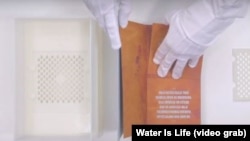The phrase “a thirst for knowledge” may soon take on a new meaning for millions of people around the world who do not have access to clean water.
An estimated 600 to 700 million people around the world are at risk of illness and even death because their drinking water is infected with harmful bacteria and other contaminants.
But a book, developed by researcher Teri Dankovich, contains specially treated pages that decontaminate water could potentially improve the lives of many who live in the developing world.
Filter paper
The book contains 25 pages, each about 1 millimeter thick, embedded with nano particles of silver. The pages are made of filter paper and designed to be ripped from the book so that water can be poured through the paper, killing harmful microorganisms and decontaminating polluted drinking water.
“There’s instructions printed on the pages that says water is unsafe to drink in your village and if you want to protect your health, use this book as a water filter, and[(it contains information about] some of the symptoms you can have if you have waterborne disease," Dankovich said.
For those who can’t read, there are pictures on the pages depicting the dangers of dirty water and how to use the book.
Dankovich will present her invention this week at the meeting of the American Chemical Society in Boston.
She and her colleague field-tested the drinkable book in Bangladesh, Ghana and South Africa, where it was well received.
Literature
Dankovich was asked whether she had considered printing classic literature on the book's pages.
“The idea of classical texts - that’s of interest maybe later. But we have discussed a little bit more exciting text. But we really haven’t had the time to go through that part," she laughed.
Dankovich said the text is written with food-safe ink, and each page can be used to filter up to 100 liters of water.
The work is being supported by the nongovernmental organization Water for Life. It costs just pennies per page to produce each book.




